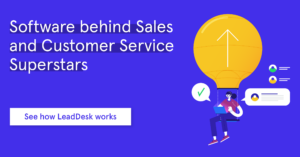How to start a virtual call center and avoid failure
Call centers are easier to establish than ever before thanks to cloud-based call center software. However, many starting entrepreneurs fail to see the critical points that make or break your start-up. To ensure you don’t fall in the same missteps, we outline the most important aspects for you to succeed.
schedule8 minute read
Call centers are easier to establish than ever before thanks to cloud-based call center software. However, many starting entrepreneurs fail to see the critical points that make or break your start-up. To ensure you don’t fall in the same missteps, we outline the most important aspects for you to succeed.
But first, why start a new call center business?
Starting up a call center business is easier than ever. Gone are the days of having on-premise servers and switchboards as a shift to cloud-based solutions is in full force. In fact, in most cases, you only need a computer, a reliable internet connection, a pair of headphones and of course a contact center software.
Some call centers are started by sales people determined to go for it alone, and some are founded by quick-witted entrepreneurs spotting a gap in their market. In inside sales, fast-growing companies see setting up a call center operation as a way to grow capacity, close more deals, and increase sales further.
In all industry sectors, where there is a new product, service, acquisition or market adjustment, sales and service lines, and the switchboard can get overloaded fast. For some businesses, the answer is to set up an in-house call center operation. For others, it is the trigger to find outsourced call center partners.
Is a call center start-up just for calls?
The simple answer, as you know, is: not any more. Call centers have become contact centers. Calls, emails, SMS / texts, social media, web chats, video, and all kinds of online service channels are now essential and expected from the modern call center start-up. The demands from end customers and clients for omni-channel capabilities have added many extra layers of complexity to a new call center start-up operation.
Too big to fail?
LeadDesk works with call centers of all shapes and sizes, from entrepreneur agents up to five-hundred-plus-seat giants. We also work with all sizes of enterprises with inside sales teams, B2B specialists, multi-site networks, and distributed teams. What more – we are here to support your growth.
Just look at the Finnish telemarketing company Prime Sales, who grew from 200K€ in annual revenue to 6M€+ by building an amazing company culture and getting the support they need.
As well as understanding the business and successes of our clients, we have also observed the factors behind failures in every size and sector. So to ensure you don’t make the same mistakes and start building a path for success, here are 7 points that will make or break your call center start-up.
The 7 points that make or break your call center start-up.
1. Personnel
The ability to attract and retain the best agents is the #1 key to success. Personnel is the biggest operational costs for call centers of any size.
There are a few factors to consider: A logical place to start is your location and its physical catchment. Are there enough skilled agents nearby? Are you capable of recruiting, enabling, and monitoring remote agents? Can your software handle it?
Then there is the soft side. Do you have the skills to keep your agents motivated, help them work more productively, and keep the best agents working for you?
And it’s not just people skills. Soft values are important. Company culture is important. However, your choice of technology and tools has a big part to play. Call centers that fail typically use weak software that is unable to evaluate agent performance, that’s awkward to use for agents and doesn’t gamify the agent experience. In other words, software that distracts agents from closing.
2. The call center’s role
There are some basic questions that some call center start-ups never answer. Are we inbound or outbound? Are we strategic or tactical? Are we cutting edge or traditional? What is our approach to customer service? How do we present our results? How do we get new business?
Some call center entrepreneurs or business managers lack any idea of what their offer is for clients, and what could make them stand out in the market. There are inside sales teams that have no clear role within the organization, no clear relationship with other internal stakeholders, and worse, antagonists on the board from inception. It’s not a surprise that these call centers are some of the fastest and most spectacular to fail.
3. Scalability
Call center start-ups must plan for growth. Internal call center business units must be able to scale up or down. All call center businesses need to be able to adjust to peak demand from different clients, campaigns, and seasons.
Technology, facilities and personnel must be able to scale rapidly without penalty and without disruption. Management needs to have the skills to handle change, expansion, or contraction. Scalability must be a strong thread in call center business planning to avoid failure.
4. The call center business
A key thread running through struggling and failed call centers is that they did not anticipate the particular needs of the call center business. The clichéd call center factory is a myth. Modern call centers are sophisticated businesses working with cutting edge technology. The margins can be low and the competition is fierce. And the competition is using every advantage.
Part of the uniqueness of the call center business is the reliance on dedicated software that must be totally reliable, and offer a consistently high-quality experience. This can mean call center-grade call quality over VoIP, and also mean highly responsive online customer service with user journey tracking – all things that are technology-dependent.
Call centers also rely on call center -class speed of decision-making. The right software monitoring and automation tools help here, but the right, rapid business decisions are needed for the outset. Failing call centers have usually failed to do their industry research and did not get expert industry advice.
5. Industry sector factors
Not all call center business is the same. Different industry sectors have very different demands. The technology you need, the regulations you must comply with, the leads you need, your success criteria, and your risk profile can all vary dramatically.
Consider this: in some sectors, such as publishing telesales, we have seen call centers fail because they did not adopt the industry-standard software used by the highest volume clients and their outsourcers. In consumer construction campaigns, call centers need leads that include insightful building data. In B2B, call centers need efficient meeting booking tools and the ability to bring in third parties to the process.
Call center start-ups, with their first client waiting, often underestimate the different resources required to switch sectors. The same phenomenon can be found in inside sales. If a sales team is set up with a specialty, to serve a specific product line or business unit, it may be hard to adapt to add value to other product lines or business units later.
Contrarily, with the right software and awareness of sector-specific demands, you can be successful.
6. Technology and software
Call center operations are typically run based on one software platform. The choice of software is absolutely critical. The strengths or limitations of your software will dominate the actions of your agents, managers, and business decision-makers. Your software dictates how your agents interact, how you monitor, how you report, how you integrate with other systems, and your software, and its reliability determines if you are always closing deals – or looking at a blank screen!
Your choice of software can solve many of those issues. Choose the right software! It’s arguably one of the most important decisions you have to make. Get hands-on demos. Get the vendors on your shortlist to put you in touch with other businesses like yours. And finally, be sure to check out our Buyers Guide to know what to look for in a call center software.
7. Agility
Call center start-ups are born out of need or opportunity. They do not appear in a vacuum. If you’ve got clients to service, and customers to contact, you need to get up and running instantly. There is no time for systems training. There’s no time to ramp up software. You need systems that work, now. You need people to work, now.
And, once you are up and running, you need to have the capability to constantly evaluate and improve your performance. And you have to do it. You have to improve and demonstrate improvement to every client in every campaign. Your choice of virtual call center software is pivotal here. Many new call center units within large organizations have failed as they were tied to legacy hardware technology, or stuck with CRM systems that they had to fight against from the start.
You also need to be able to adjust to new campaigns, new results, new channels, and new regulations, rapidly. A lot of call center businesses that fail are just too slow. The best virtual call center software lets you manage everything yourself, without needing to rely on outside help from vendors support or in-house IT.
Have you put thought into all of this?
The LeadDesk contact center software includes everything you need to get up and running. LeadDesk is the perfect choice for new call centers of all sizes, internal business units, and start-ups. All you need is a computer, headset, and a stable internet connection. LeadDesk is scalable, reliable, compliant, and fast. Very, very, fast. And you only pay for what you use. Get in touch. Try it.

